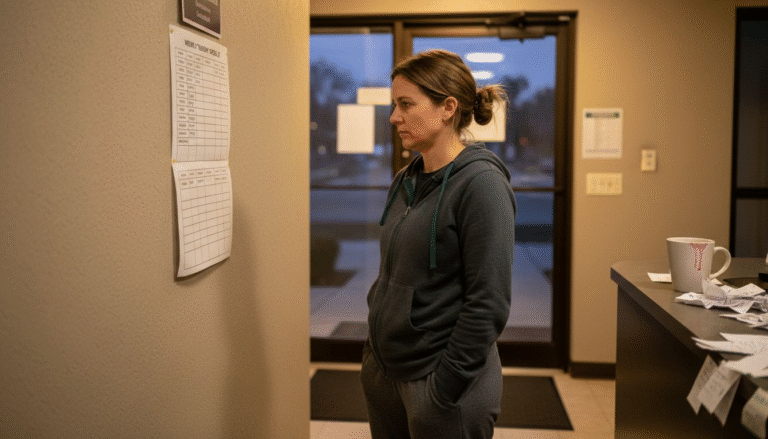Nearly one in ten adults in the United States will face substance abuse at some point, yet only a fraction seek help. Many worry that getting treatment will interrupt work, school, or family life. Outpatient programs change this reality by offering flexibility, community support, and cost-effective options for recovery. These programs let you heal without losing momentum in your daily routines, providing practical solutions that fit into real-world demands and responsibilities.
Quick Summary
| Takeaway | Explanation |
|---|---|
| 1. Flexible scheduling supports your recovery | Outpatient programs allow treatment integration with daily responsibilities, including work and family commitments. |
| 2. Individualized care addresses specific needs | Treatment plans are tailored to your unique circumstances, focusing on personal challenges and mental health. |
| 3. Maintain daily responsibilities while healing | Outpatient treatment empowers you to continue professional and personal obligations alongside recovery efforts. |
| 4. Community support enhances recovery | Group sessions foster connections with peers who share similar experiences, reducing feelings of isolation. |
| 5. Cost-effective treatment options available | Outpatient programs offer affordable solutions without the need for residential care, making recovery financially accessible. |
Table of Contents
- Flexible Scheduling To Fit Your Life
- Access To Specialized And Individualized Care
- Ability To Maintain Daily Responsibilities
- Supportive Community And Peer Connection
- Cost-Effective Treatment Option
- Family Involvement And Therapy Opportunities
- Continued Access To Resources And Aftercare
1. Flexible Scheduling to Fit Your Life
Recovery doesn’t have to disrupt your entire life. Outpatient programs offer a revolutionary approach to treatment that allows you to heal while maintaining your daily responsibilities.
Traditional rehabilitation models often require complete separation from your normal routine. But outpatient treatment understands that your life doesn’t pause for recovery. According to research from Psychology Today, these programs provide unprecedented scheduling flexibility that integrates treatment seamlessly into your existing lifestyle.
With outpatient programs, you can attend therapy sessions and support meetings around your work schedule, educational commitments, or family responsibilities. This means you can continue earning income, pursuing your academic goals, and supporting your loved ones while simultaneously working on your personal recovery journey.
Practical scheduling options typically include:
- Morning sessions for early risers
- Evening meetings for those with daytime work
- Weekend availability for maximum convenience
- Online telehealth options for remote participation
The key advantage is maintaining continuity in your personal and professional life. You are not isolated from your support network or forced to step away from important life responsibilities. Instead, recovery becomes an integrated part of your ongoing personal development.
By choosing an outpatient program with flexible scheduling, you’re demonstrating commitment to both your healing and your existing life commitments. Ready to explore a treatment approach that works around your schedule? Contact our admissions team to discuss personalized program options that fit your unique needs.
2. Access to Specialized and Individualized Care
Every person’s journey through addiction and recovery is unique. Outpatient programs recognize this fundamental truth by providing deeply personalized treatment approaches that address your specific needs and challenges.
Traditional one-size-fits-all treatment models often fall short. According to research from Psychology Today, modern outpatient programs offer comprehensive interventions tailored specifically to individual circumstances.
Individualized care means your treatment plan is crafted around your specific situation. This approach goes beyond surface-level symptom management and digs deep into understanding the root causes of your substance use. Professional clinicians work closely with you to develop a multifaceted strategy that addresses not just addiction, but underlying mental health concerns, personal triggers, and life challenges.
Comprehensive treatment typically includes:
- Individual counseling sessions
- Group therapy opportunities
- Family therapy options
- Holistic wellness approaches
- Mental health support
The power of specialized care lies in its adaptability. Whether you are dealing with workplace stress, family dynamics, academic pressures, or complex emotional experiences, your treatment plan can be adjusted to provide targeted support. This means you are not just receiving generic advice but experiencing a truly personalized path to recovery.
By choosing an outpatient program with individualized care, you are investing in a treatment approach that sees you as a whole person. Want to explore how a customized recovery plan can transform your journey? Contact our team to discuss your unique needs and potential treatment strategies.
3. Ability to Maintain Daily Responsibilities
Recovery doesn’t mean putting your entire life on pause. Outpatient treatment offers a powerful approach that allows you to heal while continuing to meet your personal and professional obligations.
Many people fear that seeking treatment will force them to step away from work, school, or family commitments. According to research from Naaman Network, outpatient programs are specifically designed to support your ongoing life responsibilities.
The structured yet flexible nature of outpatient treatment means you can attend therapy sessions and receive comprehensive care without sacrificing your career, education, or family roles. This approach recognizes that financial stability, professional growth, and personal relationships are crucial components of a successful recovery journey.
Key advantages of maintaining daily responsibilities include:
- Continued income and job security
- Uninterrupted academic progress
- Sustained family support networks
- Real world stress management practice
- Building recovery skills in your everyday environment
By participating in treatment while managing your regular responsibilities, you develop practical coping mechanisms that translate directly into your daily life. You are not isolated from your support system or removed from the contexts where you are learning to manage challenges. Instead, recovery becomes an integrated process of personal growth and transformation.
Research from Moving Mountains Recovery highlights that most outpatient programs require just a few hours of treatment per week. This means you can continue working, studying, or caring for your family while receiving the support you need.
Ready to explore a treatment approach that works with your life, not against it? Contact our admissions team to discuss how we can support your recovery without disrupting your important life commitments.
4. Supportive Community and Peer Connection
Recovery is not a solitary journey. Outpatient treatment offers a powerful antidote to isolation by creating meaningful connections with others who understand your experiences.
According to Psychology Today, group sessions in outpatient programs are more than just meetings. They are transformative spaces where individuals can share their struggles, celebrate victories, and build genuine support networks.
The magic of peer connection lies in shared understanding. When you sit in a group session, you are surrounded by people who have walked similar paths. This eliminates the shame and loneliness that often accompany addiction. Instead of feeling judged, you experience empathy, recognition, and hope.
Powerful benefits of community support include:
- Reduced feelings of isolation
- Increased accountability
- Real life coping strategy sharing
- Emotional validation
- Mutual encouragement
These group interactions provide more than emotional support. They offer practical insights. Someone who has successfully navigated similar challenges can offer strategies that clinical advice alone cannot. You learn not just from professionals, but from the lived experiences of your peers.
Outpatient programs create structured environments where these connections can flourish. Group therapy, support meetings, and shared activities become opportunities for genuine human connection. You are not just receiving treatment you are becoming part of a community committed to healing and personal growth.
The transformative power of peer support cannot be overstated. Research shows that individuals who feel connected to a supportive community are more likely to maintain long term recovery. Want to explore how a compassionate recovery community can support your journey? Contact our team to learn more about our supportive program options.
5. Cost-Effective Treatment Option
Recovery should never be financially out of reach. Outpatient programs offer a meaningful path to healing that doesn’t require breaking the bank or exhausting your entire life savings.
Research consistently shows that outpatient treatment provides a significantly more affordable approach to addiction recovery. According to a comprehensive study published in the National Institutes of Health, outpatient drug-free programs demonstrated the most cost-effective treatment modality with substantially lower expenses per successfully treated case compared to residential or inpatient alternatives.
The primary reason for these reduced costs is simple. Unlike inpatient programs that require 24/7 medical supervision and residential facilities, outpatient treatment eliminates expensive overhead expenses. You receive high quality professional care while maintaining your existing living arrangements and continuing to meet your personal and professional responsibilities.
Key financial advantages include:
- Lower overall treatment costs
- No residential facility expenses
- Continued ability to work
- Minimized indirect economic disruptions
- Flexible payment options
Outpatient programs understand that financial stress can be a significant barrier to seeking treatment. By designing more accessible and affordable care models, these programs remove economic obstacles that might otherwise prevent individuals from getting the support they need.
If legal complications are part of your recovery journey, our guide on alternative sentencing can provide additional insights into managing treatment costs and legal challenges.
Ready to explore a treatment approach that supports your recovery without depleting your financial resources? Contact our admissions team to discuss affordable treatment options tailored to your specific needs.
6. Family Involvement and Therapy Opportunities
Recovery is rarely a solo journey. Outpatient programs recognize that healing extends beyond the individual and encompasses entire family systems, creating opportunities for collective growth and understanding.
According to Psychology Today, family involvement is a critical component of successful long-term recovery. These programs provide structured environments where families can learn, heal, and rebuild relationships damaged by addiction.
Family therapy in outpatient settings goes beyond traditional counseling. It is a transformative process that helps loved ones understand addiction as a complex health challenge. Professional therapists guide families in developing healthier communication patterns, establishing supportive boundaries, and creating environments that nurture recovery.
Key benefits of family therapy include:
- Improved communication skills
- Understanding addiction as a health issue
- Rebuilding trust and emotional connections
- Learning effective support strategies
- Addressing underlying family dynamics
By involving families in the recovery process, outpatient programs create holistic healing environments. Loved ones are not just spectators but active participants in the journey toward wellness. They learn how to support their family member without enabling destructive behaviors.
Research from Better Addiction Care highlights that family involvement significantly increases the likelihood of sustained recovery by creating robust support networks and addressing systemic challenges.
Ready to explore how family therapy can transform your recovery journey? Contact our admissions team to learn more about our comprehensive family support programs.
7. Continued Access to Resources and Aftercare
Recovery is a lifelong journey that extends far beyond initial treatment. Outpatient programs provide comprehensive aftercare support that ensures you have continuous resources and guidance long after your initial recovery phase.
According to Psychology Today, continuity of care is crucial for sustained recovery. These programs recognize that healing is not a destination but an ongoing process of personal growth and self-discovery.
Aftercare resources go well beyond traditional follow-up sessions. They create a robust support network designed to help you navigate challenges, prevent relapse, and continue building the skills necessary for long-term wellness. These resources adapt to your evolving needs, providing flexible support that grows with you.
Comprehensive aftercare typically includes:
- Follow-up therapy sessions
- Alumni support groups
- Skills development workshops
- Community resource connections
- Relapse prevention strategies
Our guide on aftercare plans provides deeper insights into how these supportive frameworks can transform your recovery journey. These resources are not just safety nets they are empowerment tools designed to help you build a resilient, fulfilling life.
Research from Better Addiction Care highlights that ongoing support significantly increases the likelihood of sustained recovery by providing consistent guidance and community connection.
Ready to explore how comprehensive aftercare can support your path to wellness? Contact our admissions team to learn more about our integrated recovery resources.
Below is a comprehensive table summarizing the main concepts and benefits of outpatient treatment programs for recovery as discussed throughout the article.
| Topic | Description | Benefits/Outcomes |
|---|---|---|
| Flexible Scheduling | Programs that fit therapy around work, school, and family responsibilities. | Continuity in life; integration with personal development. |
| Specialized Care | Personalized treatment that addresses individual challenges. | Addresses mental health; provides targeted support. |
| Daily Responsibilities | Allows participants to work and maintain family roles during treatment. | Continued income; practical coping mechanisms in daily life. |
| Supportive Community | Peer connections in group sessions for shared experiences and support. | Reduced isolation; increased accountability and empathy. |
| Cost-Effective Option | More affordable than inpatient care; flexible payment options. | Lower costs; minimal disruption to income and responsibilities. |
| Family Involvement | Involves families in therapy for collective healing and understanding. | Improved communication; rebuilt trust and support systems. |
| Continued Access to Resources | Ongoing aftercare support like therapy sessions and alumni groups. | Sustained recovery; empowerment through continuous support. |
Ready to Experience the True Benefits of Outpatient Recovery?
Struggling to find a program that lets you heal without taking you away from work, family, or daily life? The article “7 Key Advantages of Outpatient Programs for Recovery” outlines just how crucial it is to combine flexible scheduling, individualized treatment, and community support into a single recovery plan. If you want access to morning, evening, weekend, or even telehealth sessions, Glendora Recovery Center has programs designed around your real needs. Our tailored care treats both substance abuse and mental health with respect and proven expertise.
Do not let another day slip by while you wait for the perfect time to reach out. Discover how Glendora Recovery Center can help you integrate recovery seamlessly into your daily life. Take your first step and contact our compassionate admissions team today for a confidential consultation. Your path to personal growth and lasting wellness begins here.
Frequently Asked Questions
What are the scheduling options available in outpatient programs for recovery?
Outpatient programs offer flexible scheduling options that fit around your daily life. You can choose morning, evening, or weekend sessions to ensure that treatment does not disrupt your work, school, or family commitments.
How does individualized care work in outpatient programs?
Individualized care in outpatient programs means that your treatment plan is tailored specifically to your unique needs and circumstances. You will work closely with clinicians to develop a strategy that addresses underlying issues, personal triggers, and mental health concerns.
How can I maintain my daily responsibilities while attending outpatient treatment?
Outpatient treatment allows you to continue working, studying, or caring for your family while receiving care. You’ll only need a few hours each week for therapy sessions, enabling you to integrate recovery into your everyday life without sacrificing your responsibilities.
What are the benefits of community support in outpatient programs?
Community support in outpatient programs reduces feelings of isolation and fosters connections with others who share similar experiences. Participating in group therapy sessions helps build accountability and provides valuable coping strategies through shared insights and emotional validation.
How does outpatient treatment support long-term recovery?
Outpatient programs provide ongoing aftercare resources that are vital for long-term recovery. You can access follow-up therapy, alumni groups, and skills development workshops, ensuring you have the ongoing support needed to manage challenges and prevent relapse.
What role does family involvement play in outpatient recovery?
Family involvement is a crucial aspect of outpatient recovery, as it helps rebuild trust and improve communication within the family. Structured family therapy sessions guide family members in understanding addiction and provide them with strategies to support their loved ones effectively.



